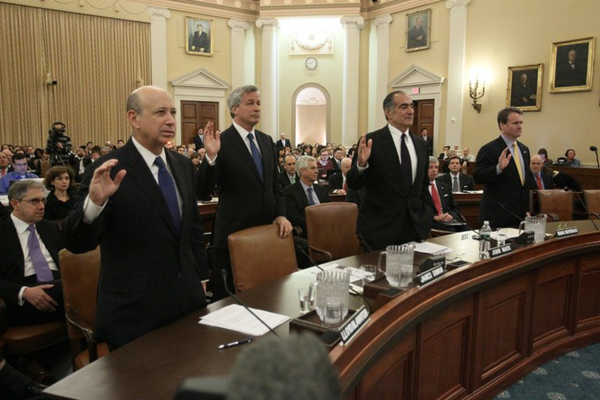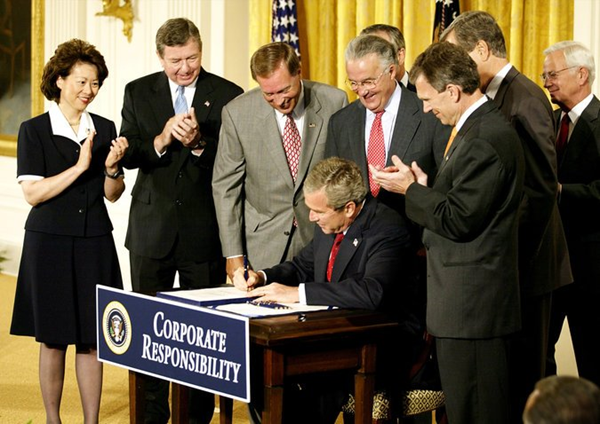
BUSINESS DAY
After 20 Years of
Financial Turmoil, a Columnist’s Last Shot
Fair Game
By
GRETCHEN
MORGENSON
NOV.
10, 2017
|

Financial executives appearing in
2010 before a congressional panel investigating the financial
crisis. From left, Lloyd C. Blankfein of Goldman Sachs, Jamie
Dimon of JPMorgan Chase, John J. Mack of Morgan Stanley and
Brian T. Moynihan of Bank of America.
Doug Mills/The
New York Times |
For the past 20 years or so, as a business columnist for The New York
Times, I’ve had a front-row seat for bull and bear markets, scandals,
crises and management mischief.
But I am leaving The Times, and this is my last shot at Fair Game. So
it seems a fitting moment to look back at what’s changed and what
hasn’t in the financial world, for better or worse.
| |
Fair Game
A
column from Gretchen Morgenson examining the world of finance
and its impact on investors, workers and families
See More »
|
| |
|
In addition to a string of garden-variety banking and business
scandals, four seismic financial events occurred during my time as a
columnist: the collapse of the Long-Term Capital Management hedge fund
in 1998, the bursting of the dot-com bubble in 2000, the accounting
scandals of Enron in 2001 and WorldCom in 2002, and the mother of them
all — the mortgage debacle — in 2008. That one brought world economies
to the precipice and wiped out Lehman Brothers and a raft of troubled
banks.
That many episodes
of financial tumult in two decades seem like a lot.
Some of this
turmoil has generated positive change. Accounting scandals, for example, have
been much rarer since Enron and WorldCom shook the financial markets. One
reason: a 2002 federal law, known as Sarbanes-Oxley, requiring top executives to
attest to the accuracy of their companies’ financial statements.
“Sarbanes-Oxley
came into effect 15 years ago, and there have been fewer accounting scandals and
more accountability,” said
Jack Ciesielski, founder of R. G. Associates
and publisher of The Analyst’s Accounting Observer, an accounting research
service. “Those accounting scandals were a crisis we should be thankful for; we
got through it, a law was passed, and it works.”
It’s too bad that
the mortgage crisis six years later didn’t result in heightened accountability.
Here’s another
sign of progress: Believe it or not, corporate directors are more active in
their oversight than they used to be. Egregious board practices and chummy
appointments are less common.
Nell Minow is a
corporate governance expert and vice chairwoman at
ValueEdge Advisors, a firm that guides
institutional shareholders on reducing risk in their portfolios. She has been
rattling cages in the governance field since the mid-1980s and says she’s seen a
definite improvement in boardroom makeup and practices.
“When I started in
this field, O. J. Simpson was on five boards, including the audit committee of
Infinity Broadcasting,” she recalled in an interview. “And at another company,
the C.E.O.’s father was on the compensation committee. We’ve come a long way.”
That’s not to say
that problems arising from sleepy and clubby boards have been eradicated.
“Exhibit A is executive compensation,” Ms. Minow said. “The first C.E.O. pay
package I ever complained about was $11 million. The very fact that that has
gone completely berserk shows that boards are still a long way from where they
should be.”
A case in point:
Thomas M. Rutledge, the head of Charter Communications, who received $98 million
in 2016, according to
Equilar, a compensation analytics company.
Yes, he’s an outlier, but the average chief executive compensation at 200 large
public companies last year was almost $20 million, Equilar said.
Something else
that hasn’t changed over the decades is analyst and investor reliance on
companies’ creative earnings calculations. These figures, which do not conform
to generally accepted accounting practices, typically exclude costs that
companies incur in their operations. Such costs include stock awards given to
executives and employees and merger expenses. Excluding them makes a company’s
results look more dazzling than they otherwise would.
Inventive earnings
calculations, while more prevalent today, were very popular in the lead-up to
the dot-com crash. Back then, analysts valued companies based on imaginative,
nonfinancial
metrics like the number of page views a
retail website received or the percentage of “engaged shoppers” visiting a site.
That didn’t end well, even for many companies that had exhibited highly engaged
shoppers and millions of views.
“I find it ironic
that GAAP is much better than it has been for a long time, but analysts have
more disdain for it,” Mr. Ciesielski said, referring to generally accepted
accounting principles. “They blindly accept the methodology that management
gives them. Folks prefer darkness, I guess.”
To be sure,
embracing management’s preferred financial figures isn’t as perilous when stock
prices are rocketing. Bull markets cover a multitude of sins, after all. But as
the dot-com episode showed, genuine earnings growth — the kind companies can
take to the bank — becomes a crucial underpinning when share prices turn down.
That’s not true with financial metrics that can only be characterized as
“earnings before the bad stuff.”
|

President George W. Bush signing
the Sarbanes-Oxley Act in 2002. The bill aimed to improve the
accuracy of companies’ financial statements.
Stephen Jaffe/Agence France-Presse — Getty Images |
My
search for truths on Wall Street and elsewhere over the years has
sometimes raised hackles. That’s to the good. It wasn’t my job to be
part of a company’s spin machine.
But responses from
my subjects could get a little kooky. A favorite example occurred in the early
2000s, and it involved a major Wall Street firm.
I had written
about an arbitration case that an investor client had brought against the firm.
The firm prevailed in the matter, and the general counsel convened a dinner to
celebrate.
In a phone
conversation, the firm’s general counsel told me that the menu for the dinner
had featured a photograph of me, placed inside a red circle with a slash though
it. The general counsel told me how he had scoured the web for just the right
picture. The menu garnered lots of laughs from the attendees, he added.
I never did find
out what that celebration cost the firm’s shareholders.
Incidents like
that, however, were relatively rare. And they were far outweighed by the
appreciation that readers expressed.
“You must continue
your work of skewering people and customs in our capitalist society that abuse
the process,” a reader in Jackson, Miss., wrote in 2001. Others expressed thanks
for my being “a good and consistent questioner,” for writing for the
“financially illiterate,” for pushing to make the rules for investing fair and
firm.
And I loved
receiving a Christmas card from a reader in Maryland a couple of years ago that
simply said: “Thank you for telling truth!”
Believe me, it has
been my privilege.
Twitter:
@gmorgenson
A version of this article appears in print on November 12, 2017, on
Page BU1 of the New York edition with the headline: The Reflections Of
a Truth Seeker.
© 2017 The
New York Times Company

